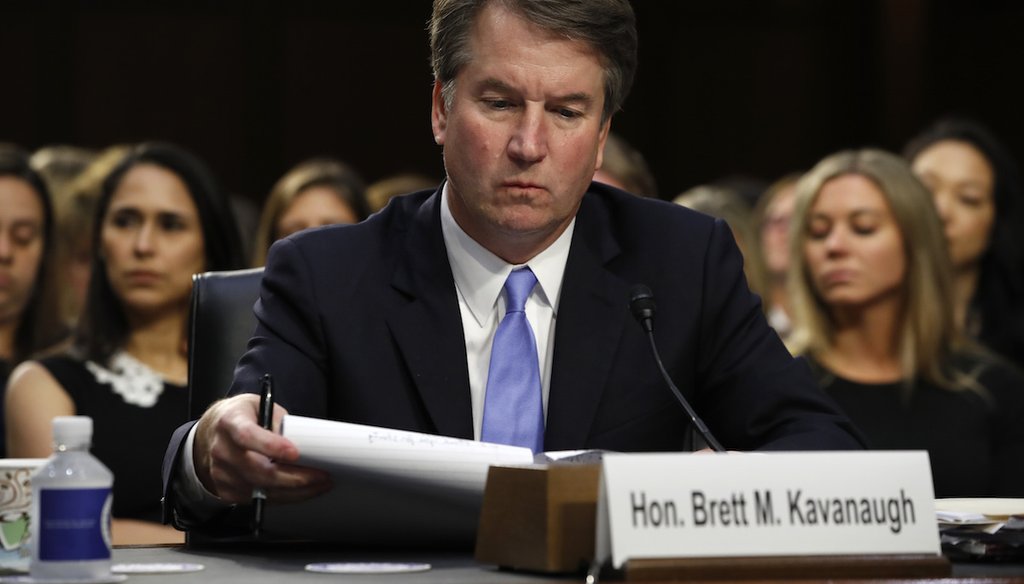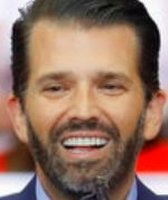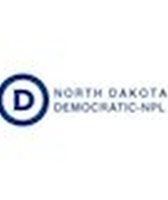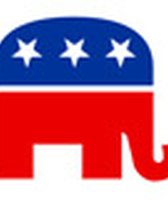Get PolitiFact in your inbox.

Brett Kavanaugh faces Senate confirmation hearing on Sept. 6, 2018.
Brett Kavanaugh, President Donald Trump’s Supreme Court nominee, is facing a tough confirmation hearing in the Senate.
Kavanaugh hopes to replace retiring Justice Anthony Kennedy, the median justice who often cast swing votes to break ideological ties. Kavanaugh would almost certainly tilt the court right.
We noticed that many questions during his hearing centered on presidential powers, abortion, and Kavanaugh’s unreleased documents. We decided to provide factual context for the each of those points.
Democratic senators are particularly concerned that Kavanaugh would protect Trump from his legal troubles. They peppered Kavanaugh with a series of questions on the limits of presidential powers, particularly in the face of criminal investigations.
Kavanaugh dodged most of these questions by invoking what he described as the "Ginsburg rule," after Justice Ruth Bader Ginsburg, who was appointed by former President Bill Clinton. The idea is that, as Ginsburg did during her confirmation hearings, nominees should offer no hints or forecasts about specific cases.
Sen. Patrick Leahy, D-Vt., asked whether the president, as Trump claims, has an absolute right to pardon himself.
"The question of self pardons is something I’ve never analyzed," Kavanaugh said.
Kavanaugh may not have analyzed it, but we have. We found that even legal experts who argue that a president can’t pardon himself tend to agree that no one really knows for sure.
Leahy also asked whether the president could pardon associates to keep them from testifying against him. Kavanaugh said he would not answer the hypothetical question.
We looked into that same question in July 2017. Experts told us that if Trump pardoned someone who was the target of the investigation, he or she would be immunized from prosecution.
Special counsel Robert Mueller "could not use the grand jury or other prosecutorial tools, such as search warrants, to investigate someone whom he cannot indict," said Ronald D. Rotunda, a law professor at Chapman University who was an investigator during Watergate and later an advisor to special prosecutor Kenneth Starr during the Clinton administration. "That would be a real abuse of the prosecutorial power."
However, using a pardon to shield one person would not necessarily terminate the entire probe. To really shut down the investigation using pardon power, a president would either have to separately pardon a multitude of individuals by name, or else issue a blanket amnesty.
While a pardon shields a person from prosecution, it does not shield them from the subpoena power of Congress. What’s more, lawmakers may use their oversight and impeachment authority to address what they see as any untoward exercise of presidential pardons.
Sen. Chris Coons, D-Del., asked whether Kavanaugh believes a president can fire at will a prosecutor who is criminally investigating him. Kavanaugh avoided specifics.
Kavanaugh: "Well that’s a question of precedent and it’s a question of, that could come before me either as a sitting judge on the D.C. circuit or if I’m confirmed as a Supreme Court justice, so I think that question is governed by precedent that you’d have to consider. United States vs. Nixon, of course, the special prosecutor regulation in that case was at issue in United States versus Richard Nixon in the — "
(The Nixon decision held that the president is not immune from subpoenas. Kavanaugh has not indicated so far that he would change that.)
Coons: "Judge if I could, I’m just asking whether you stand by your record — something that you chose to write in 1998. You expressed a view at the time that a president can fire at will a prosecutor criminally investigating him. Is that still your view?
Kavanaugh: "Well that would depend —"
Coons: "I’m just trying to understand if you stand by that publicly expressed view back in 1998."
Kavanaugh: "I think all I can say, senator, is that was my view in 1998."
In an article that ran in the Georgetown Law Journal in 1998, Kavanaugh criticized the lack of executive oversight given to the independent counsel. Experts told us the independent counsel he wrote about differs slightly from the special counsel; the former is a creature of a statute that no longer exists, while the latter is overseen by the Justice Department which reports back to the executive branch.
"In any event, Justice Scalia also argued that a federal prosecutor should be removable at will for more practical reasons -- that ‘the primary check against prosecutorial abuse is a political one’ and that the independent counsel system thwarts this traditional check on a prosecutor's actions. If there is an out-of-control prosecutor, Justice Scalia reasons that the president should possess the authority and the responsibility to remedy the situation," Kavanaugh wrote.
Mary Ziegler, a law professor at Florida State University, said that doesn’t mean the opinion should be disregarded.
"Even though he wasn’t writing on exactly the same issue, he was still expressing a viewpoint about the executive power the Trump administration might have been attracted to," Ziegler said.
Experts told us that if Trump's firing of Mueller were challenged in court, it’s not entirely clear which rules would take precedence. That’s a crucial point because the Justice Department and Congress have given conflicting guidance on removing a special counsel.
Schumer offered a similar critique of Kavanaugh’s opinion on the subject in July: "He has said the president shouldn't be investigated." We rated that Half True.
Kavanaugh wrote in a 2009 law review article that civil suits and criminal investigations take away from a president’s focus on work responsibilities. He didn’t call for the court to take away the power to investigate the president; he said that Congress could consider writing a law to exempt the president. They have passed no such statute.
Sen. Kamala Harris, D-Calif., questioned Kavanaugh on whether he had spoken about the Mueller probe with lawyers at Kasowitz, Benson and Torres, which was founded by Trump’s personal lawyer. Kavanaugh said he did not recall.
An affirmative answer wouldn’t mean much if Kavanaugh is confirmed; experts told us there are no binding requirements on recusal.
"It is important to know that whether a Supreme Court justice recuses him or herself is totally up to the justice," said Brian Kalt, law professor at Michigan State University.
The hearing was delayed by over an hour on Sept. 4 as Democratic senators pressed to postpone the proceedings entirely. Their complaint was about the limits on access to documents from Kavanaugh’s tenure in the White House of George W. Bush, an issue that has plagued Kavanaugh’s nomination from the start.
Kavanaugh worked in the White House Counsel’s Office from 2001 to 2003, then served as staff secretary to Bush from 2003 to 2006.
The Presidential Records Act established that a gatekeeper from the administration would make sure there was no really sensitive information to get out when documents were required, as during the hearings. The National Archives would be involved as well.
When the National Archives said they could not procure the documents before October, Senate Republicans decided to proceed anyways. Senate Democrats opposed, but were denied a vote to postpone the hearing. Instead, Republicans looked to the Bush White House gatekeeper to release the documents.
They released 42,000 pages of documents on the eve of the hearing. The Trump White House withheld 100,000 pages of records by asserting executive privilege. Some of those records, however, were subsequently leaked to the New York Times.
Sen. Cory Booker, D-N.J., took particular issue with deeming "committee confidential" emails that touched on race. Booker made a show of his defiance of committee rules by publishing the emails via Twitter.
"All of us are ready to face that rule on the bogus designation of ‘committee confidential.’ Just because there is a Senate rule doesn’t mean it can be misapplied or misconstrued or misused," Booker said.
Senate Judiciary Committee Chair Chuck Grassley’s office, however, said the documents had already been made public the morning Booker released them.
The designation of "committee confidential" is not uncommon, as a fair number of documents are classified as such in intelligence hearings. Like the rest of Democrats, Booker was concerned at the vetting process, particularly the conflict of interest that may arise when both Kavanaugh and the gatekeeper worked in the same administration.
More questions centered on a 2003 email exchange that mentioned Roe. vs. Wade. Kavanaugh has not expressed explicit opposition to the Supreme Court decision that legalized abortion.
"I am not sure that all legal scholars refer to Roe as the settled law of the land at the Supreme Court level since Court can always overrule its precedent, and three current Justices on the Court would do so," Kavanaugh wrote in regards to another Senate confirmation hearing.
Experts told us that indeed, not all academics view Roe as settled law, but that the statement doesn’t confirm what Kavanaugh would do. Still, it helps to define what precedent means to him.
"Probably the most telling thing here is his pretty clear statement that the court can always overrule precedent," Ziegler said.
His diction in discussing birth control litigation also raised a few eyebrows. Kavanaugh seemed to call birth control pills abortion-inducing drugs. In fact, he was citing the definition of the religious group Priests for Life.
Kavanaugh’s most vocal stance on abortion was highlighted as a member of the D.C. Circuit court of appeals, when he wrote a dissenting opinion in a case that concerned whether a pregnant 17-year-old being held by immigration authorities was allowed to leave their custody to obtain an abortion.
In his dissent, he suggested that the government should be given time to find a sponsor for the 17-year-old immigrant before such an important decision is made. Kavanaugh also noted that Roe vs. Wade applies to undocumented minors. Experts told us it shows that Kavanaugh believes that the government has a strong interest in not facilitating abortions.
Clarification and editor’s note, Sept. 12, 2018: An earlier version of this story published Sept. 7 repeated uncritically a Democratic talking point, that Kavanaugh mentioned birth control by using the term abortion-inducing drugs. We later fact-checked a version of the claim and rated it False. We revised this story on the evening of Sept. 10 to remove the inaccurate talking point and an expert’s commentary on it. However, we initially failed to note that we removed and changed the text. We made a note of the changes for the first time on the morning of Sept. 11. Several readers noticed the delay and asked us about it. The lack of notation was an oversight and a mistake. Our corrections policy requires that we note significant updates to stories, and we apologize for failing to note the change at the time we made it.
Correction, Oct. 3, 2018: This story originally misstated which state Coons represents in the U.S. Senate. He represents Delaware.
Our Sources
Archives.gov, Letter to Grassley, Aug. 2, 2018
Phone interview with Mary Ziegler, law professor at Florida State University, Sept. 6, 2018
Email interview with Sean Coit, Chris Coons spokesman, Sept. 6, 2018
Georgetown Law Review, The President and the Independent Counsel, Vol. 86: 2133, 1998
C-SPAN, Video: Independent Counsel Statute Future Feb. 19, 1998
Email interview with Saikrishna Prakash, professor and Miller Center senior fellow at the University of Virginia School of Law, Sept. 6, 2018
PolitiFact, Can Robert Mueller subpoena Donald Trump? A look at the legal precedents, May 9, 2018
PolitiFact, Can the president pardon himself? 4 questions about the presidential pardon, July 21, 2018
PolitiFact, What Trump’s Supreme Court nominee Brett Kavanaugh has said on abortion, July 10, 2018
New York Times, Kavanaugh emails on Roe vs. Wade, March 24, 2003
AP, Trump administration withholds 100K Kavanaugh pages, Sept. 1, 2018












































